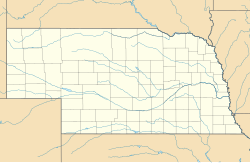Omaha Quartermaster Depot Historic District
The Omaha Quartermaster Depot Historic District, including several brick structures built in Italianate and other styles, was built for the U.S. Army between 1881 and 1894. Located in South Omaha between Hickory and 22nd Streets, Woolworth Avenue and the Union Pacific Railroad main line in Omaha, Nebraska, the depot was listed on the National Register of Historic Places as a historic district in 1979. The depot previously operated as United States Army Reserve facility. The facility is considered surplus by the GSA and was put up for auction in the fall of 2013.
Omaha Quartermaster Depot Historic District | |
 Exterior of the depot | |
| Location | Omaha, Nebraska |
|---|---|
| Coordinates | 41°14′39.45″N 95°56′35.85″W / 41.2442917°N 95.9432917°W |
| Architectural style | Italianate |
| NRHP reference No. | 79003685[1] |
| Added to NRHP | July 26, 1979 |

History
editIn 1892, the depot commissary from Fort Leavenworth, Kansas, moved to Omaha.[2] The U.S. Army's Department of the Platte used the depot as a storage and distribution source for military outposts for 20 years, including its peak activity during World War I. During that period, the depot supplied camps and National Guard units throughout the Midwest.
During the Great Depression, the depot was activated as part of Franklin D. Roosevelt's New Deal program as a supply base for Civilian Conservation Corps camps across the United States. The depot previously operated as United States Army Reserve facility.[3] On November 19, 2013, the property was put up for auction by the General Services Administration.[4]
References
edit- ^ "National Register Information System". National Register of Historic Places. National Park Service. January 23, 2007.
- ^ (nd) Fort Leavenworth, Kansas. Retrieved 5/16/07.
- ^ (2007) More Nebraska National Register Sites in Douglas County[usurped]. Nebraska State Historical Society. Retrieved 5/16/07.
- ^ "Sale of Government Real Property" (PDF). Retrieved 15 April 2014.
External links
editMedia related to Omaha Quartermaster Depot Historic District at Wikimedia Commons

